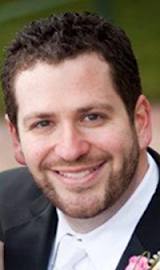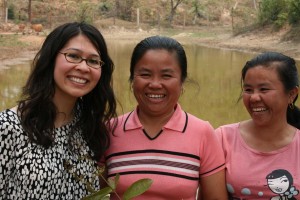Alumni Stories
We often hear from alumni of the Total Leadership course about the impact it has had. Please find below a sampling of the stories we’ve heard. On the right you can view short videos of alumni talking to students about their experiences in our course and read in the text entries below recent notes written from alumni.
Matt Tanzer, W’02, WG ’12

Matt, who is the Chief Commercial Officer at RightCare, wrote recently to tell us about a new venture: “My wife and I just signed up to do a 350 mile charity bike ride in Israel–Jerusalem to Eilat over 7 days (including spending Shabbat in the desert). It’s got physical fitness and spirituality (Self); I’ll be sharing in a great adventure with my wife (Family); meeting new people and raising money (our fundraising goal is a combined $10K) for a wonderful cause (Community); and training for it has already given me renewed energy at RightCare (Work). Pretty awesome. What’s even better is we were deciding between this and going to Southeast Asia, which we’ve never visited and are yearning to go. However, when we thought about it as part of our circles (my wife is a TL disciple as well), the Asia trip just didn’t offer the same kind of fulfillment across our domains. I’ve been trying to instill the TL thinking throughout my life, and today’s a pretty good day on that front. TL’s been hugely impactful for me.”
Veronika Sonsev, WG ’05

Veronika, CEO and founder of inSparq, a social discovery suite for retailers, was recently selected as one of Fast Company’s League of Extraordinary Women. She writes that the Total Leadership course “really helped me think through how to strategically align the various aspects of my life so that they all benefit the same cause. Women in Wireless is a non-profit I started to help develop and promote more female leaders in mobile and digital media. In helping others, I also established relationships and made connections that helped so many other aspects of my life, including my company, inSparq.”
Bree McQuillan, WG ’11

An engineering manager at Aerco International, Bree took Total Leadership in 2010 and is quoted here on the Wharton MBA for Executives Web site: “I took this class during the term when I had my son. It was such an interesting time to take the class because I was embarking on a new part of my life, and I was concerned about how I would continue to balance my career with my new family life in the future. The Total Leadership course makes you take a deep look into your inner values and aspirations, and whether you are living your life in line with those values. You are paired up with two classmates who act as coaches for you throughout the course. What I learned in this class is something I will take with me for the rest of my life. The class forces you to ask difficult questions of yourself, to challenge yourself to be a better leader and to look for wins in your life (between career, family, community and self domains) instead of always thinking of things in terms of balancing (needing to sacrifice one area of your life to fulfill another). It was truly eye-opening to think about ways you could combine domains as opposed to always thinking in terms of trade-offs.”
Kevin Jestice, WG ’12

Kevin, a CFA and CIPM and head of Consultant Relations at Vanguard, writes about the ongoing benefits of stakeholder dialogues which are part of the Total Leadership course: “This has been the most valuable course to me in all of my Wharton studies. Quite frankly, everyone around me at work, at home, and in my community agree – they know what I’m up to because we discuss expectations openly and share more directly now – and they have provided overwhelming feedback. It’s mostly positive, and when it’s not it has been the constructive kind that is truly a gift.”
Darin Evenson, WG ’12

Darin, a U.S. Naval Officer, wanted to increase involvement with his kids and he did so by volunteering in their classes and on field trips and doing homework with the kids. He wrote: “I truly believe that education is the key to future opportunities in life, and I want to instill this belief in my kids at the earliest age, so they want to succeed in academics for their own future. I also hope to learn how to incorporate this into my schedule regularly, so I can show my direct reports that my talk about how I think they should take time to go to their kids’ soccer games, music recitals, etc. is not just lip service. Sometimes leadership by example is the best method to relay a message like this…I feel like I’m receiving huge return on my investment of resources through this experiment, and I’m eager to continue this opportunity moving forward in my kids’ education.”
Gianna Driver, W’ 04

Gianna is the founder of Gianna Fair Trade and featured in Inc.’s “30 Under 30.” She wrote recently: “After completing the Total Leadership class at Wharton, I thought a lot about how to integrate the four domains of work, home, community, and self into a successful, professional career. Years later, I found myself asking these same questions, which contributed largely to the founding of GIANNA, an eco-fashion and fair trade home décor business that works with women artisans to help alleviate global poverty.
“We work in high-needs communities abroad, empowering artisans to live wholly and authentically through sustainable, enriching commerce. The ‘business’ part of GIANNA is merely one aspect of the company — we’ve created systems (very similar to the Total Leadership framework) that educate and enable our artisans to lead self-directed lives that encompass what matters most to them. I love what I do and am honored to bring Total Leadership to artisan women around the world. It’s amazing what we can do when we remain authentic to ourselves and our values. Win-win situations really do exist!”
Corrin Silver, WG ’09

Corrin wrote that during our course “one of my experiments was to run the 10-mile Broad Street Run in Philadelphia. At the time that I undertook this experiment, I could not run one mile, let alone ten. On May 2, 2009, however, I was able to complete my goal by running all ten miles of the race! As a result of this experiment, I was pleased with not only the improvement of my physical health, but that of my emotional, mental and spiritual health as well. Training for the NYC Marathon is an extension of my original experiment; however, this time I am further integrating my community, home and career. The race is truly a four-way win for me because I will get into better condition through my rigorous training program, I am raising money for a charity that is very meaningful to me, I am training with one of my good friends and stakeholders, and I will begin my career at Bain & Company three days after the marathon both mentally and physically prepared to re-enter the business world.
Wenying (Wendy) Hu, WG ’09
Wendy wrote recently to say that this course “has made a significant impact in my life. I no longer treat work, life and family as separate and conflicting circles. They’re overlapped and can positively affect each other. As a result of one TL experiment, my productivity improved both at school and work. I advocated for a flexible working schedule and location based on business needs, using technology better. Because the time saved from peak-time driving, I was able to talk to more customers in the East Coast in the early morning at home. The result is $20K~ increased revenue and $10K~ in new license sales. With my flexible schedule, I was also able to help family when needed so that I could focus more on work; I became more efficient.”
Chris Martin, WG ‘11
Chris wrote recently to let us know that that as part of his TL experiment on a new series of lunch meetings at work at Yahoo!, he was led to the realization that “we were inappropriately charging a partner far too little in reimbursable operational expenses. The discovery led to some investigation. After my assumptions were confirmed, the results ended up with over $1.5 million in non-reimbursed expenses for the two previous quarters. This ‘found’ cash will drop directly to Yahoo!’s bottom line. While it’s possible that this issue would have been found (much) later on, I am certain the timing of the discovery was directly related to my TL experiment.”
Jay Bhatti, WG ’02
Jay wrote: “I remember a session where Prof. Friedman asked us to chart what is most important to us and then to chart how much time we spend actually doing it. In 2006, I realized what would make me most happy was something I was not doing, which was building something of my own. I quit my high profile job at Microsoft, moved to Silicon Valley, and lived in my friend’s pool house for 3 months while trying to raise capital. A year later we had over $10 million in funding and 35 employees. Many of the principles of Prof. Friedman’s classes were applied daily by me while managing 35 high-caliber employees. Even during the downturn in 2008, when I had to lay off employees and enact pay cuts, the way we handled it prompted one of our employees to come into my office and say ‘I’m proud to work here. You handled a very tough decision honestly and openly with everyone. A lot of the guys are happy to know they have a boss who is willing to take a brunt of the cuts on personally so that his employees don’t lose as much.’ In 2009, I sold my start-up and now am excited to do it all over again. Without the skills I learned in TL, I don’t think I could have gotten my first company off the ground.”
Fusun Sevgen, WG ’05
Fusun wrote that the course’s “principles have helped me very much in maintaining balance in my life so that my time with my six-year old daughter remains active and fulfilling. We go swimming, biking, and gymming (I found a gym that has a jungle gym for kids, while parents workout) together, and we have completed many charity walks. We have developed a network of friends, single mothers or young women with kids in my community to share some of these activities.
“TL principles help even more on the work front. I have been doing a global role for a few years that requires travel and ability to interact with other time zones. I have been able to build flexibility and use of technology into my daily and weekly schedule to juggle these demands. Sometimes that means doing 6 AM teleconferences at home before getting my daughter ready for school; sometimes it means being able to take 3 weeks to visit family in Turkey and relying on my Blackberry to avoid ‘the world falling apart’; and sometimes it’s dragging a colleague to the on-site gym to get our daily fitness in while we talk business J The team around me definitely has a culture that it’s not about being in the office 9-to-5, it’s about doing what we need to do to get the job done.”
Sarabjit Singh, WG ’08
Sarabjit wrote: “I helped one of my direct reports relocate to Utah for family reasons. Senior management was reluctant and not sure if it would work. We are a small company and I had to work against the old ‘face time requirement’ issue. It did take some effort to make the remote arrangement work. I’m pleased to report that last month this person got a Director-level promotion. This is yet another example that work and family don’t have to be at odds…I think I speak for all my fellow classmates and alumni that we are glad you are out there spreading the good word.”
Dave Dunham, WG ’09
Dave wrote:”The initial feedback I received from family and close friends in my stakeholder dialogues indicated that they felt like I was never actually giving them my full attention because, while with them, I was checking my Blackberry… I also realized that work was on my mind way more often than it should be given the relative importance I place on it. I decided to commit to only check my Blackberry once per night after leaving work. My wife was especially pleased with how much more focused I seemed to be on her and our children.
“Taking time in the evenings to free myself from thinking about work has certainly improved my focus when I am in the office…My direct reports and my boss have given me feedback that I seem to be less scatter-brained and more focused on the issues that I need to address. My wife has mentioned many times how much she loves that I am not tied to my Blackberry in the evenings. She feels I am much more attentive to her. Though my children are too young to explicitly say so, I believe they have benefitted from this as well…Just as my wife has given positive feedback, so have my friends…I believe this experiment has clearly moved me in the right direction to better meet my stakeholders’ expectations.”
